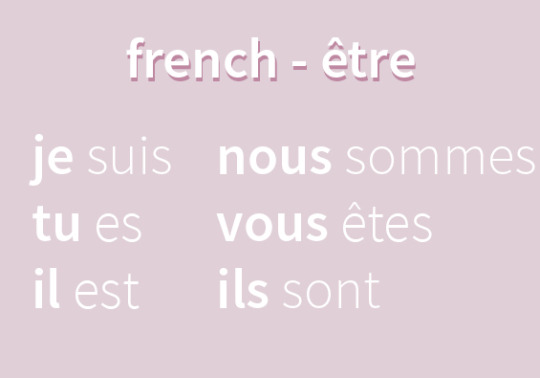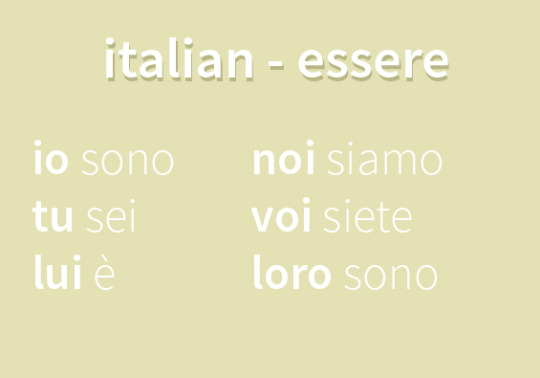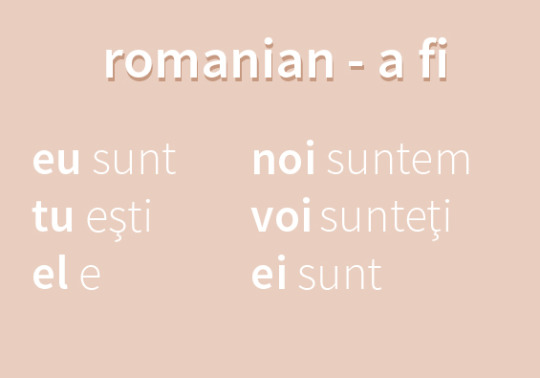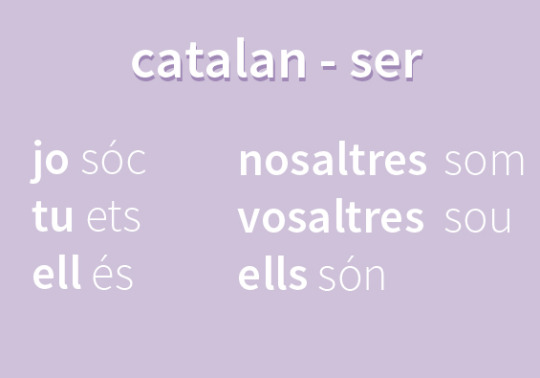Text
Norwegian TV shows you don’t need a VPN to watch
With us being all on lockdown, there’s a lot of time for language-learning, and a fun way to do that is to watch TV shows in your target language. For Norwegian-learners, NRK TV has a lot of choice. Although a lot of shows are geoblocked, there are many that are available worldwide, so here are some that I like. Feel free to reblog and add your own!
Current Affairs & Talk Shows
Kveldsnytt - daily news featuring the main headlines, sport and weather. Usually 15-20 minutes long, features news from in Norway and worldwide. Really good starting point for breaking into Norwegian TV.
Debatten - debate show about current political issues, usually 30 minutes long. Host speaks very clearly with an easy dialect, guests vary but tend to be well-spoken.
Einig? - 2-4 people sat in a room trying to have sensible discussions about politics
Sånn Er Norge - another good show for breaking into Norwegian TV as it covers cultural aspects of Norway and the host speaks in clear Oslo dialect.
Quiz Shows
Hva Feiler Det Deg? - medical quiz show where a team of three doctors go head-to-head with a team of three normal people with internet access to try and guess a person’s medical condition. Lots of medicine-related vocab so ideal for anyone wanting to go into a medical profession
Nytt På Nytt - comedy quiz show about current affairs (Norway’s version of Have I Got News For You). Lots of slang and humour related to Norwegian celebrities and politicians so better suited to higher level learners.
Documentary
Fra Bølle Til Bestevenn - reality-documentary series following six dog-owners and their naughty doggos through doggy bootcamp with a pro trainer. If you don’t fall in love with Anton then we can’t be friends.
113 - documentary series following first responders in Trondheim. Again, good for those who are interested in medicine as you’ll pick up lots of relevant vocab. Dialects vary but you’ll get a good helping of trøndersk.
Dialektriket - documentary series about different dialects throughout Norway. Super interesting if you wanna learn more about dialects and how they’re perceived by Norwegians.
Folkopplysningen - documentary series about how easily we’re influenced, covering topics related to health, science, politics, media and all sorts. Andreas speaks really clearly so it’s good for A2+
Evig Ung - documentary series about ageing and how to avoid it. Good for science nerds wants to learn/practice science-y vocabulary.
Drama
SKAM - well, it had to be mentioned! Chances are you’ve already watched (or at least heard of) this show. Lots of drama, romance, scandal and everything else you’d want from teenagers living it up in secondary school (linked episodes have english subtitles).
Blank - drama series about teenagers being teenagers. Kinda similar to SKAM but it follows completely new characters each season and is a bit less OMG DRAMA.
Lovleg - series following 16yo Gunnhild starting a new life at a new school in Sandane. Also similar to SKAM with slightly less drama. Mostly vestlandsk dialects. Wlw in season 2.
Comedy
Side Om Side - sweet and light-hearted sitcom based around the day-to-day lives of three very different families.
Parterapi - comedy series about couples in partner therapy. Short (10 min) episodes.
444 notes
·
View notes
Note
I don’t know how I’ve never discovered your blog until now, but I love it! 💙
Awww that’s so sweet💞 feeling’s mutual!!
2 notes
·
View notes
Text
Russian dialects in maps and a little bit of history
If you’ve been learning languages for some time now, you might have noticed that Russian dialects are not very known and even most Russians won’t be able to tell you the differences. That might seem strange to a Spanish speaker or an English native (can you even count all the different dialects and accents of English in the modern UK???). And while Russia is a huge country (in both territory and population) its dialects are not very different from each other. How come?
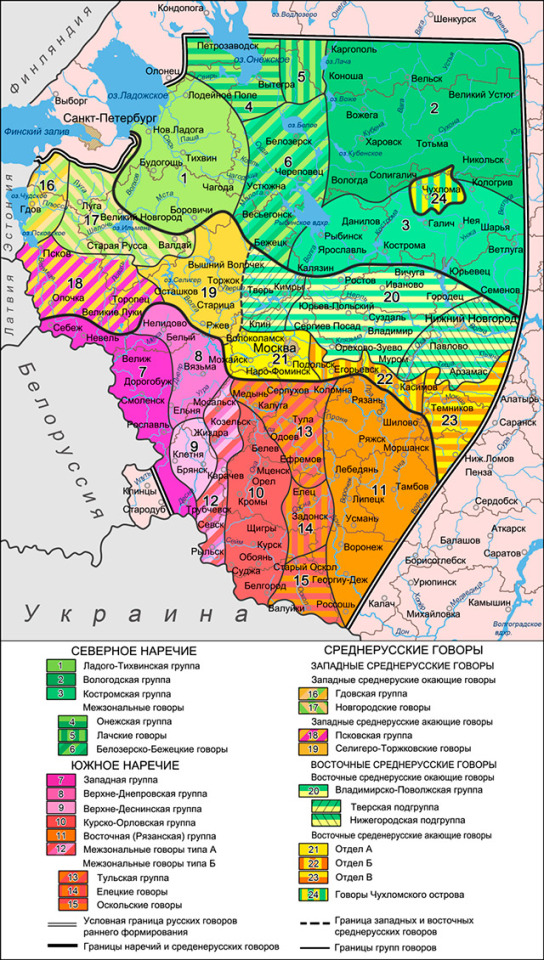
First, let’s look at the map.
This looks strange: where the hell did most of the country go? You know, like Siberia and stuff? Well, what is shown in the map is the historical territory of Russia (before 16th century), the rest of the country was discovered and colonized much later, so it didn’t have enough time to develop a special dialect before the globalization (and, more importantly, the Soviets and their pursuit to unify the language). This is why modern linguistic studies focus primarily on this region (although Siberian Russian has its own differences, but they are not as significant and maybe a topic for another post?? lmk).
As you can see, the map divides the territory into three main parts: the Northern dialect, the Southern dialect and the Middle Russian (also known as Standard Russian aka what you are going to learn as a non-native). I’m going to list below the main characteristics of each dialect, but if you understand Russian and want to know more - check out this incredible article (where I got most of the information for this post;)).
The Northern dialect is most known for okanie (оканье), which means a clear distinction between [a] and [o] in the pretonic syllable (Standard Russian: [дамá] vs Northern Russian [домá] pronunciation of дома).
The Southern dialect is most known for гэканье (pronounced [γ’ɛkənje]): the pronunciation of [г] as a fricative [γ] between vowels as opposed to [g] in Standard Russian: но[γ]а́ for нога instead of но[g]а.
But was it always seen this way? Let’s look at the map from over a century ago - 1915:

You might notice that something’s off. Yeah, it’s not exactly the territory of Russia. Here the dialects are divided into three groups: Belorussian dialects, Ukrainian dialects and Russian dialects. Since this used to be the narrative for a long time, Russian dialectology is a fairly new field.
I’ve covered the very basics in this post, so if you want to know more or have any questions/corrections please hmu!
51 notes
·
View notes
Text
A cool thing you have to know is that russian words начало (beginning) and конец (end) have the same origin: the root can be traced back to *kon-. Does anyone know of any examples of this in other languages? I’m genuinely curious
7 notes
·
View notes
Text
is there a native Norwegian speaker who can explain to me what russetiden is and why it’s called Russian time? as a Russian Norwegian learner I am very confused
9 notes
·
View notes
Text
So I’ve been working with a lot of Brits lately, and inevitably, they’ll ask about Norwegian phrases (being that we’re in Norway), and someone recently pointed out that a lot of them seemed rooted in fruits and vegetables after I had called him a potato as a compliment. He was not, in fact, very accepting of this compliment, as he thought I meant he was a couch potato, which apparently means something entirely different than what I was trying to say.
So having to clear up that whole thing, I made a list of some of my favourite Norwegian words and expressions based on fruits and vegetables that might not translate well in English!
Du er litt potet, du - You’re a bit of a potato: Compliment, meaning you can do a bit of everything. Like the potato, you’re versatile.
Din løk - You onion: Insult, meaning someone is a bit dim. Like the onion, if you peel it all away there’ll be nothing there.
Det er bare blåbær - It’s just blueberries: Expression, meaning something is simple, or something is only a minor issue.
Bite i det sure eplet - Take a bite of the sour apple: Expression, meaning having to do or accept something you don’t want to or like.
Borte som ei sviske - Gone like a prune: Expression, meaning something has completely disappeared.
Dra dit pepper’n gror - Go where the pepper grows. Insult, meaning ‘go to hell’.
Fotsopp - Mushroom foot: Medical condition, meaning athlete’s foot.
Eplekjekk - Apple handsome: Expression, meaning someone who is being cocky.
Ferskenhud - Peach skin: Compliment, meaning soft, nice skin.
Få mye pepper - Get a lot of pepper: Expression, meaning getting a lot of criticism/being reprimanded.
Høy på pæra - High on pears: Expression, meaning someone who is arrogant (head gets so big it looks like a pear)
Som plommen i egget - Like the yolk in the egg. Expression, meaning someone is perfectly relaxed and comfortable.
Nappe seg i løken - Yank the onion: Expression, meaning a man who masturbates.
Smårips - Little redcurrant: Expression, meaning young girls. Often in connection with an older person taking a romantic/sexual interest in someone significantly younger and/or underage.
Sur som en sitron - Sour like a lemon: Expression, meaning someone is angry.
Tråkke i salaten - Step in the salad: Expression, meaning having done something inappropriate or something foolish.
Tyttebærpoliti - The lingonberry police: Expression with a negative connotation, meaning a security guard. Originated with the private security firm Securitas because of the logo.
Være på bærtur - To be picking berries: Expression, meaning someone is completely lost/wrong.
Slippe en bønne - Release a bean: Expression, meaning someone farted.
Prinsessen på erten - The princess on the pea: Insult (sort of), meaning someone is high maintenance. A reference to the fairy tale the Princess and the Pea.
5K notes
·
View notes
Photo
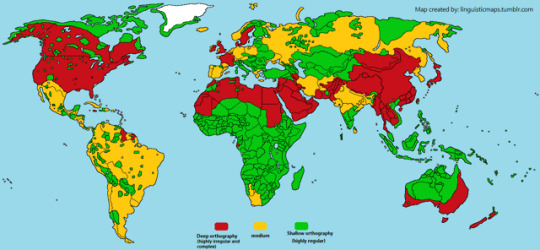
Orthographic depth
Languages have different levels of othographic depth, that means that a language’s orthography can vary in a spectrum of a very irregular and complex orthography (deep orthography) to a completely regular and simple one (shallow orthography).
English, French, Danish, Swedish, Arabic, Urdu, Tibetan, Burmese, Thai, Khmer, Lao, Chinese, and Japanese have orthographies that are highly irregular, complex and where sounds cannot be predicted from the spelling. These writing systems are more difficuld and slow to be learned by children, who may take years. In the medium of the scale there’s Spanish, Portuguese, German, Polish, Greek, Russian, Persian, Hindi, Korean, where there are some irregularities but overall the correspondence of one sound to one phoneme is not that bad. At the positive end of the scale there’s Italian, Serbo-Croat, Romanian, Finnish, Basque, Turkish, Indonesian, Quechua, Ayamara, Guarani, Mayan languages, and most African languages (because there were no history of spelling, so a new one of scratch was made as very regular), they all have very simple and regular spelling systems, with usually a one-to-one correspondence between sounds and letters. These are very easily learned by children.
Orthographic depth has several implications for the study of psycholinguistics and the study of language processing and also acquisition of reading and writing by children.
Note: remember that there’s no objective numbering on the three categories I made, there are more than just these three categories, because it works like a spectrum. Three categories were used just as a means for simplification.
2K notes
·
View notes
Text
100 hours of French : COMPLETE!
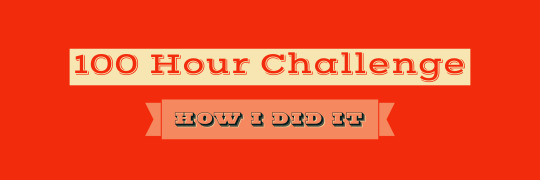
I loathe French. I loathe it so much, because I’ve been trying to conquer it for five years, over five separate attempts [2014, 2015 in HS, 2016 preparing for CLEPs, late 2016 in class, 2018 over summer], and coming up empty every time. So, I decided to have a personal challenge, and reach B1 over 100 hours of quality studying, by May 1st.
Initially:
My CEFR level according to just an online test on Kwiziq:
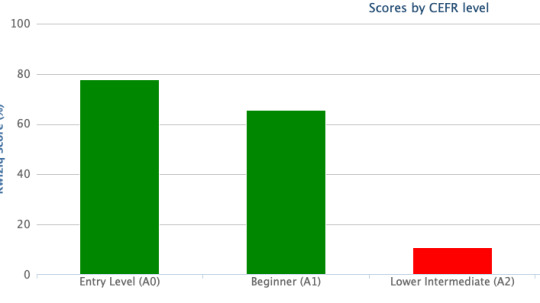
… was a very low A2. nothing to write home about!
my passive grammar knowledge wasn’t much better:

What did I do?
As some of you already know, I had a system for getting my vocabulary back up to snuff, and its detailed methodology post can be found: right here. I started doing this a few weeks before I decided to shoot for 100 hours, and finished about three weeks before I hit 100 hours.
However, this isn’t all I did. Here’s how my study time broke down:
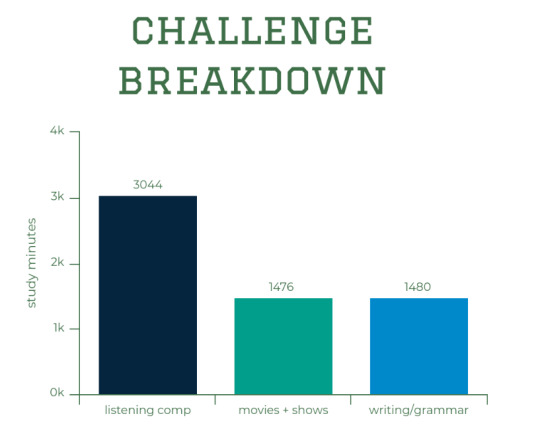
Listening comprehension: Around 50% of the 6000 minutes I spent studying [50 hours], were spent on listening comprehension. This was very important to me, because I had never been able to watch anything in French, or listen to anything, and understand it. I knew I was going to have spend a lot of time on pronunciation and French media. I still can’t watch a French movie without subtitles [obviously!], but I can listen to News in Slow French and understand around 80%? So that’s pretty cool.
how I strengthened listening comprehension:
Language Transfer: Introduction to French [6-8 minutes each]
Coffee Break French: Seasons 1-3 [15-25 minutes each]
News in Slow French [15-25 minutes each]
Movies + shows: I spent 25 hours watching stuff in French, and learning a lot of colloquial language and specialized vocabulary that I wouldn’t have stumbled upon myself! 90% of these, I also have vocabulary lists for [those helped me pay attention, pausing and writing down vocab to look up later].
things I watched:
French movies on Netflix: The African Doctor, Il A Tes Yeux
French series on Netflix: A Very Secret Service
Netflix Originals with French Audio and Subtitles: e.g. Watership Down, The Unicorn Store, How It Ends
Writing/grammar:
Most of my writing was covered with my vocabulary system. After that ended, I kept a language journal for the next month, with the starter post detailing what I would write about. Most of those posts can be found in my #language journal tag. Sometime in March, I also borrowed Teach Yourself: French Grammar from my library, because of all the resources I own myself… I have zero French stuff. I posted some notes from that book, and made a lot of reference posts in my language journal.
how I studied grammar:
Teach Yourself: French Grammar [there’s a newer version now, but I worked with the one I linked]
Lingolia: French [grammar site]
Lawless French [grammar site]
ElearningFrench [mini course based from FSI]
Français Avec Pierre [Youtube channel, he also has a blog and courses–i think those are paid–to see, 7-10 minute videos he does with his wife, all captioned!]
Laddering ! [for one week, I studied Japanese via a French course, so I got a lot of practice with that]
Discord server [Putting this here because I often posted questions and received help from my friends, so definitely have some way to check yourself!]
a lot of other things, but this was the majority of my grammar study..
When did I do this?
An unspoken rule for myself was that I didn’t want to actively study French past 8 pm. I usually studied from 9-11 am on weekdays. Some days I would keep going until 2 pm, but usually I had work. Occasionally, I’d study for half an hour or so on my lunch break. Then, another hour as I listened to podcasts on my commute.
In total, the challenge took 72 days, 11 of which I actually didn’t do anything, so more like 61. This means I averaged 1 hour and 38 minutes of French studying per day. I had zero desire to max myself out. I just wanted to make sure whatever I studied, I was paying attention! Plus, I needed time to prepare for work and keep up with my students in other languages, so having French on the brain all the time would’ve hindered me.
So, what about now?
Now, I test as this on the CEFR level:
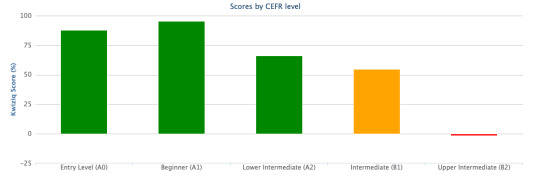
and this is my grammar ranking:

Can we say, success?! I got back to B1, and not a LOW B1, but actually fairly decent ! I’m at the point now where I can write in French pretty quickly and, I’m right on the cusp of being able to explain my way around concepts that I don’t yet have the vocabulary for.
So yeah, challenge over! Now, I’m back to studying Japanese via French so that I can retain that knowledge, and I’ve switched my phone over to French. I need to get back to writing letters in French to keep up with that, but overall I’m very happy with my B1 again, and feel more confident in my skills.
If you have any questions, feel free to shoot me an ask!
341 notes
·
View notes
Text
Similar words in Russian and Spanish
Russian \ Spanish
луна \ luna (moon)
ночь \ noche (night)
это \ esto (this)
нoс \ nariz (nose)
торт \ torta (cake)
море \ mar (sea)
и \ y (and)
деньги \ dinero (money)
день \ día (day)
погасить \ apagar (to turn off, to put out)
ни…ни \ ni…ni (neither…nor)
я \ yo (I)
суббота \ sábado (saturday)
каждый \ cada (each)
I know that both of these are IE languages, but I still found it really cool when I started learing Russian that I could find all these similarities between it and my native language Spanish!
Feel free to add to it if anymore stand out to you!
386 notes
·
View notes
Video
The Sing In Your Language Challenge!
My friend asphodelly and I have come up with an idea for a langblr challenge! All you have to do is record a short video of yourself singing in your native language to help others in learning new words and to introduce your musical culture.
If you do tag the post with #SingInYourLanguageChallenge and tag us in it so we can enjoy it! :)
In this video we’re singing the song by Земфира - Мы разбиваемся.
Here are the lyrics:
Мы разбегаемся по делам,
Земля разбивается пополам,
Сотри меня, смотри в меня,
Останься. Прости меня за слабость
И за то, что я так странно и отчаянно люблю.
Вздох сожаления на губах
Зависли в неправильных городах,
Звонки телефонные под луной,
Границы условные. Я с тобой.
Смотри, смотри в меня, Останься,
Прости меня за слабость.
И за то, что я так странно и отчаянно люблю.
If you want to hear us singing Бумбокс - Вахтерам, check it out here.
#Singinyourlanguagechallenge#russian#russian language#langblr#russian music#cover#music#challenge#guitar#ukulele#ukulele cover
30 notes
·
View notes
Text
Translators’ Telephone Game: what happens when you translate a phrase 18 times
This linguistic experiment was conducted by the newspaper “Nedelya”: 18 translators, each one with an excellent knowledge of two languages, was to translate the phrase given to him/her by his/her colleague and pass it on to the next person to do the same. The passage for the experiment was taken from Nikolai Gogol’s "The Tale of How Ivan Ivanovich Quarreled with Ivan Nikiforovich” – the description of a character Agafya Fedoseyevna:
Она сплетничала и ела вареные бураки по утрам и отлично хорошо ругалась – и при всех этих разнообразных занятиях лицо ее ни на минуту не изменяло своего выражения, что обыкновенно могут показывать одни только женщины.
(She gossiped, ate boiled beetroots in the morning, and swore splendidly; and amidst all these various occupations her countenance never for one instant changed its expression, which phenomenon, as a rule, women alone are capable of displaying)
The translators took the text and set to work.
In English hardly any changes were made; in German, however, the neutral “gossiped” turd into an evocative “talked scandal”, and the character’s face “had no expression at all, in a manner known to every woman”.
The next stage was Japanese. Its characteristic politeness made the translator change “talk scandal” into a more neutral “chatter”, and “swear” became “use bad language”.
In Arabic the character already “tattled” instead of “chattered”, and “uttered appalling curses” instead of merely “used bad language”.
A Frenchman took up the baton: “She was in the habit of gossiping, when eating her beetroot soup; a flood of the most appalling curse words would leave her mouth – all that without a single change in her countenance. That’s what all women do.”
Although by this point the passage had changed quite a bit, its misadventures were only beginning.
The phragment went through Indonesian (where there is a single pronoun for both “he” and “she”), Dutch, and Turkish: “When the woman was hurling insults, eating a thin concoction of beetroots, the man occupied himself with gossip. Both of them were doing that without expressing their feelings, in a commonly female manner”
Hardly anything changed in Spanish, except that “throwing” replaced “hurling”. A creative Sudanese translated the phrase from Spanish into Yoruba: the more concrete “concoction of beetroots” was replaced by the more vague “fruit/vegetable concoction”, and the more broad “gossip” changed into “showing off his imaginary feats”.
The next person translated the passage into English once again, adding his own corrections. In his version of the text the woman drank “fruit concoction” and “threw bad things about” ; the man’s behaviour was described with the help of the English idiom “to blow one’s own trumpet” .
The extract then went through the Bambara and then the French language, changing “things” into “stuff”; in Italian it sounded as follows: “She drank compote and threw unnecessary stuff away from the house, and he sounded the horn with an almost feminine excitement.” The causes of the transformations are clear – isn’t it simpler to say “compote” instead of “concoction”, and you can understand “trumpet” literally!
The following changes were all pretty reasonable: the Czeck version had “junk” instead of “unnecessary stuff”, a more concise “enthusiastically” replaced “feminine excitement”, and, apparently, under the influence of the horn “house” became “hut”. The Norwegian changed “enthusiastically” into “jubilantly”, and the Swede made the phrase more orderly by adding a participal turnover: “After drinking her compote, she…” etc.
And finally, there came the last stage of translating the passage back into Russian:
Выпив компот, она выбросила из хижины старье, а он радостно забил в тамтам*.
(After drinking her compote, she threw away junk from the hut, and he sounded the horn* jubilantly)
*see here for notes
(From a popular science linguistics book “Путешествие в слово” by Э. А. Вартаньян)

1K notes
·
View notes
Text
I guess it depends on the context, but usually it means one of the following:
"the fact that"
"То, что я учу русский уже несколько лет еще не значит, что я могу общаться с носителями" - "The fact that I've been studying Russian for several years now doesn't mean I can talk to natives"
"That thing that"
"Передай, пожалуйста, то, что ты сейчас держишь в руках" - "Please hand me that thing that you are holding right now"
I might have forgotten something so be sure to add any other explanations!
20 points to whoever can explain “то, что” to me.
24 notes
·
View notes
Text
Russian person: *points at an owl* сова
French person: *abruptly turns around* Très bien, merci
19K notes
·
View notes
Text
At least 37 dead, dozens missing after a fire blaze in a shopping mall in Kemerovo, Russia

The fire alarm didn't work and the doors in the cinema on the third floor where the fire started were locked, which led to people being literally trapped in the smoked building. An entire class of children that went there to watch cartoons is now missing, and it's unlikely that they'll be found since it was nearly impossible to get out. I've seen videos of people banging on the doors from the inside trying to escape, I've seen videos of people jumping out the windows, one of which was an 11 yo boy. The entire city is up tonight watching the news as the numbers of dead and missing increase, a lot of people are waiting for news on their missing relatives. And the most fucked-up thing - while it was going down, our main channels still showed political debates and documentaries about our newly-elected president instead of talking about the horrors of Kemerovo.
This is very very painful to me, as I was born and raised just 200 kilometers from there. My heart broke as I was reading the witnesses' stories, stories about being trapped in literal hell. Kids were calling their parents and relatives to say goodbye as they were slowly dying from smoke, unable to get out. About 200 animals died in a small zoo there because noone could save them from their cages. I just can't believe that so many people who simply decided to spend this Sunday morning at the movies with their family or friends lost their lives in such horrible way when this could have been easily avoided by basic fire safety. But nobody gave a shit then, and nobody will in a couple of weeks.
I guess I'm just angry. I'm mad and I'm pissed off and I can't do anything. Please don't let this story die, please don't let them be forgotten.
25.03.2018.
72 notes
·
View notes




